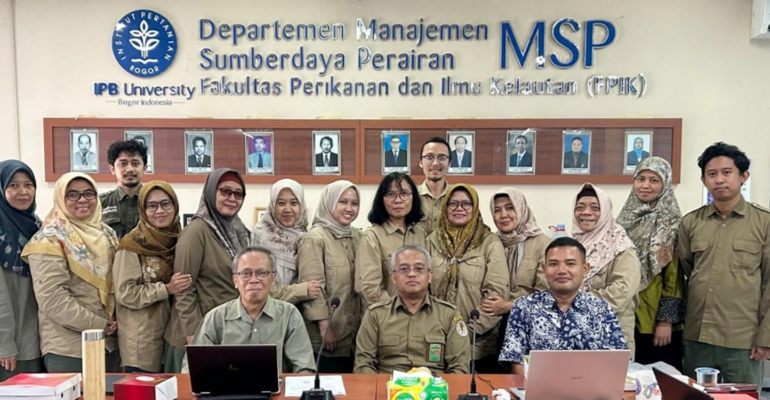Department of MSP IPB University Gives Input to the Guidelines for Environmental Management Assessment of Fisheries and Marine Sector

The Department of Aquatic Resources Management (MSP), Faculty of Fisheries and Marine Science (FPIK) IPB University received a visit from the Center for Standardization of Environmental Quality Instruments (PSIKLH), Ministry of Environment and Forestry (KLHK). The visit was in order to get input from MSP IPB University academics related to the preparation of the draft environmental management study.
Since last year, PSIKLH KLHK has been marathoning the preparation of environmental management study guidelines for various businesses and activities that already have an Indonesian Standard Business Classification (KBLI). The list containing KBLI that is required to prepare environmental management documents is contained in the Minister of Environment and Forestry Regulation (PermenLHK) No. 4 of 2021 concerning List of Businesses or Activities that are Required to Have Amdal, UKL-UPL, or SPPLH.
“In the future, KLHK will continue to compile the environmental management study guidance document,” said Widhi Handoyo, SKM, MT, Chairman of PSIKLH who together with 15 members of the group visited the MSP Department of IPB University.
The PSIKLH team had previously consulted with a number of research institutions or centers within the Ministry of Maritime Affairs and Fisheries (KKP). The consultation was carried out to obtain an overview of the business process of fisheries and marine activities, which is a source of impact on environmental components, especially fresh and marine waters.
“Getting input from academics is one of the steps taken in preparing the draft guidelines for environmental management studies,” concluded Widhi Handoyo.
Prof Hefni Effendi, Chairman of the MSP Department and Dr Ali Mashar as an expert in the fisheries sector of IPB University provided input on the draft guidance documents being formulated by the PSIKLH team. There were 15 draft documents presented simultaneously.
“Thank you to PSIKLH for giving trust to the IPB University team to provide input on the draft document at this time, even at a similar activity last year,” said Prof Hefni.
In this discussion, Prof Hefni and Dr Ali Mashar illustrated the possibility of environmental problems that arise when doing business in the fisheries and marine sectors. The fisheries business for which environmental assessment guidelines are being made includes fisheries in inland water, freshwater ponds, ponds, coastal waters, and hatcheries, for various types of fishery commodities such as: fish, shrimp, crustaceans, molluscs, and seaweed.
“There are several things that have escaped the attention of the drafting team. This is one of the important meanings of this meeting, namely the complementary synergy between the PSIKLH team and a number of academics,” said Prof Hefni.
On the following day, the PSIKLH team also held discussions with several IPB University experts in the fields of horticulture and animal science. The aim is the same, namely to get input on the draft environmental management guidance document that is being prepared, especially from the business process aspect.
The next step is the application test that will be conducted on business actors in the three sectors (fisheries, horticulture, livestock). In addition to knowing whether the draft guidelines are applicable to the real conditions of the business, they also want to get feed back on the draft guidelines from the perspective of business actors.
“With this guideline, business people in the fisheries, horticulture and livestock sectors will be guided and facilitated in their efforts to help preserve the environment where these business activities operate. This is because the contents of this document can be a foothold in formulating environmental management measures that must be implemented by business actors,” concluded Prof Hefni. (HEF/Rz) (IAAS/Ard)



